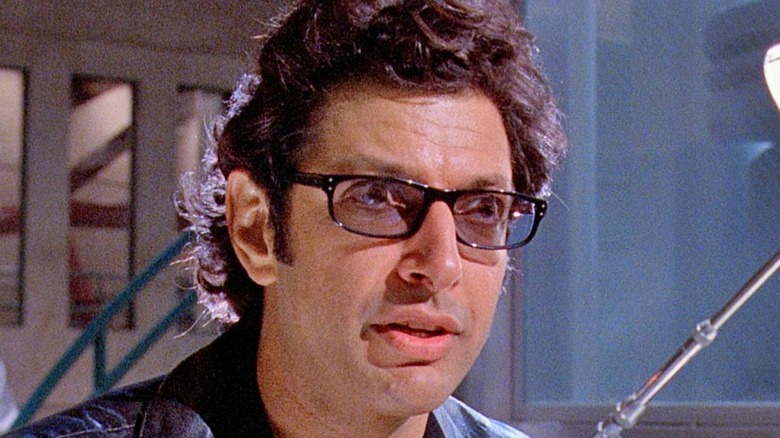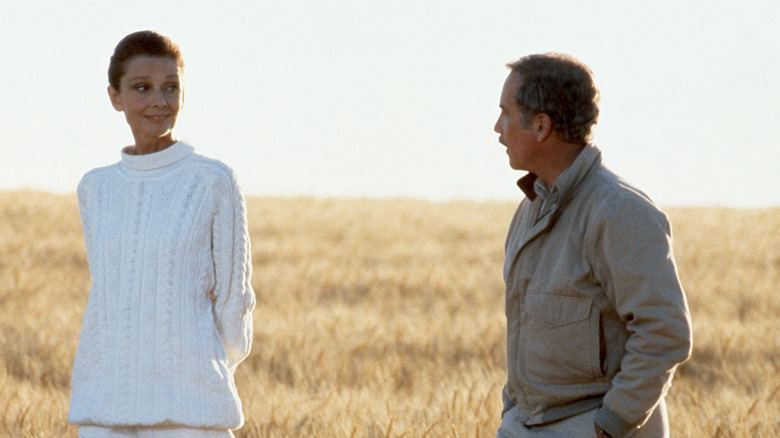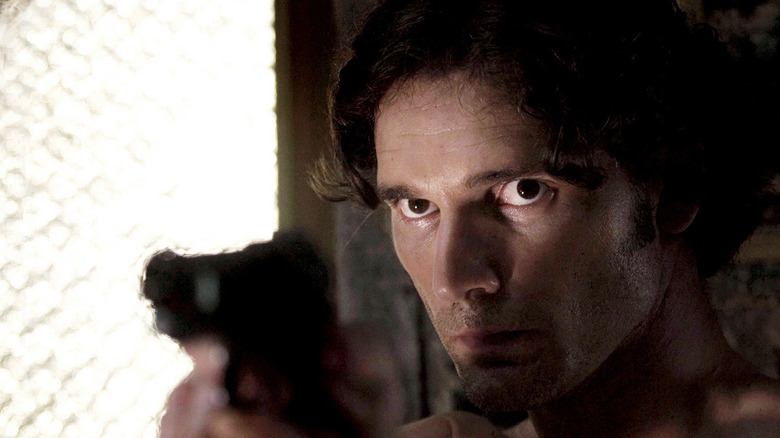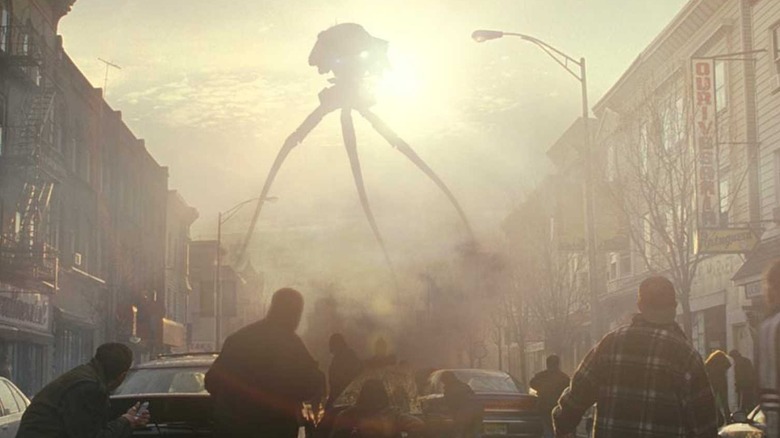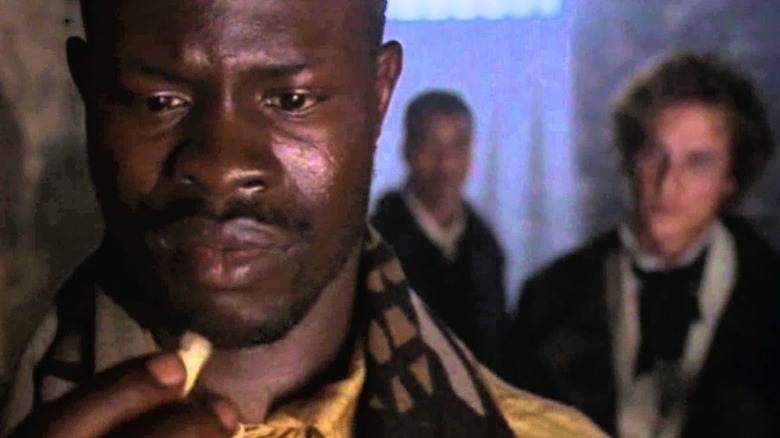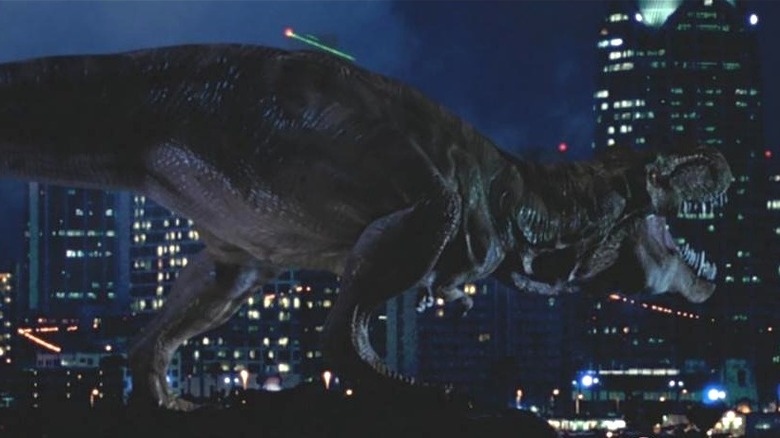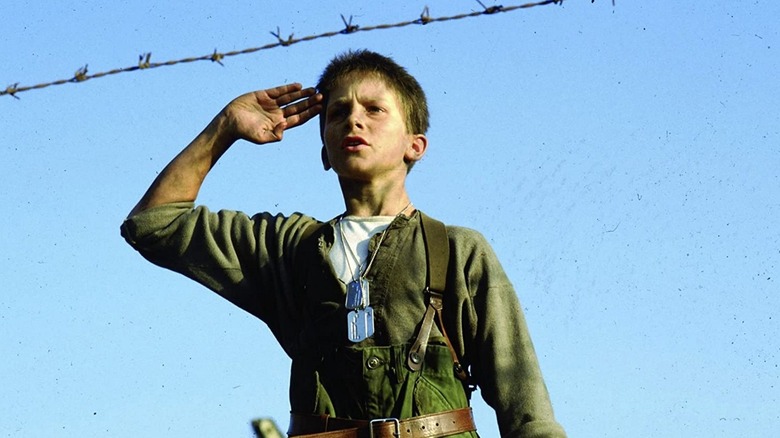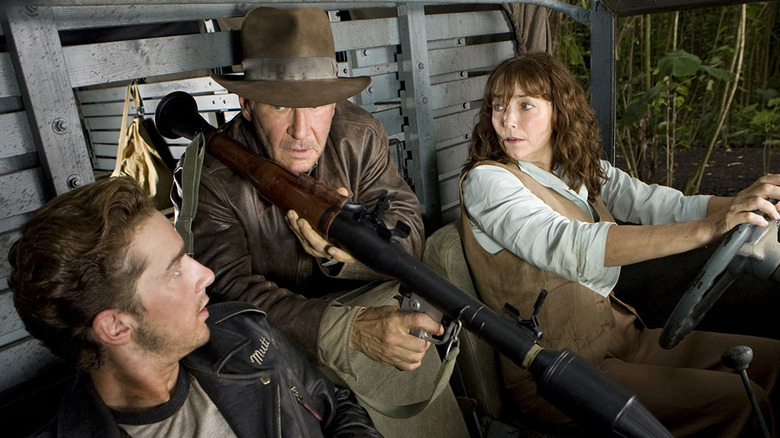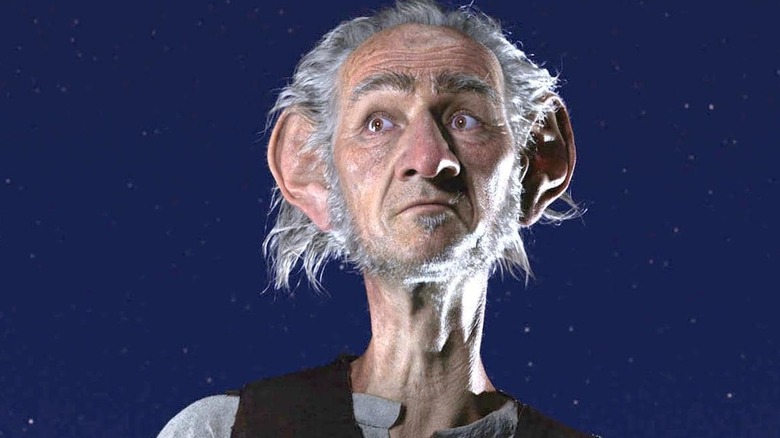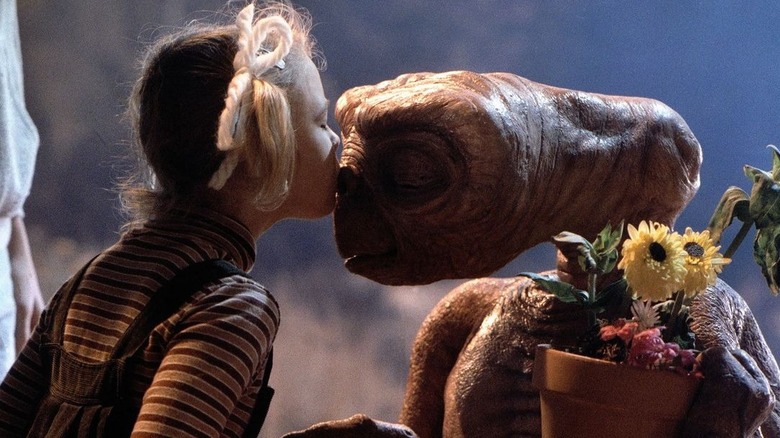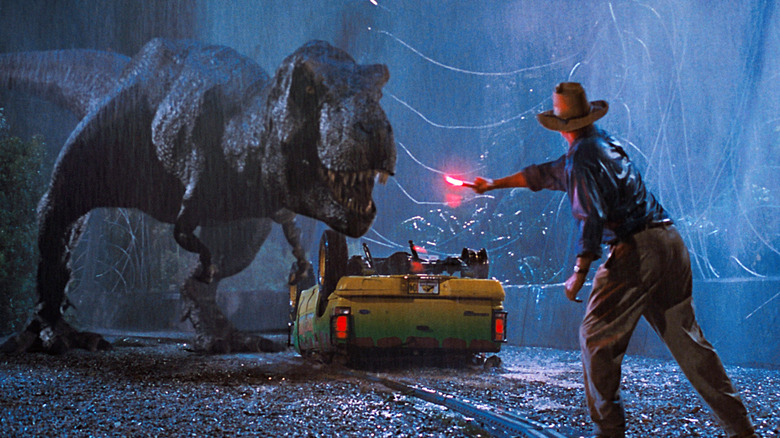Steven Spielberg's Biggest Blockbusters And Bombs
Steven Spielberg's name is synonymous with box office success. As a producer and director, Spielberg's films have earned more than $26 billion worldwide, including the "Steven Spielberg Presents" movies that were promoted with his name above the title ("Back To The Future") and the big hits that borrowed heavily from his style ("Jurassic World"). As a director alone, his movies have earned $10 billion worldwide, putting him atop the all-time directors chart, at nearly double his closest competitors. If Spielberg as a director were a franchise, he'd be behind only the MCU, but he'd be No. 1 if you include the films he produced, too. So yeah, dude's got the touch.
While King Midas could never touch a turkey, "the Bespectacled, Bearded Box Office Bard" (nobody calls him that, but we'll go with it) has made some colossal failures over his half-century cinematic career. For box office blockbusters, we'll keep it simple: We're ranking his hits according to worldwide gross not adjusted for inflation. Inflation plus international box office numbers muddies the waters, so some of his most beloved classics won't make the list. For box office bombs, we'll rank them according to how much we estimate they lost based on the maxim that a movie has to make twice its production budget to make money. What are the highest highs and lowest lows of "the Bespectacled, Bearded Box Office Bard?" (Okay, we'll stop.) Here are Steven Spielberg's biggest box office blockbusters — and biggest box office bombs!
Bomb: Always
When you ask a film fan "What's Steven Spielberg's biggest bomb?", nine times out of ten they're going to say "1941." This is incorrect. In fact, it's not even close. "1941" cost $32 million to make and made $94 million worldwide, a steep slide from "Jaws" and "Close Encounters of the Third Kind" to be sure, but it earned an estimated $30 million profit. "1941" is more famous for bringing the boy wonder back to Earth, not for putting the studio in the red. The same can be said for the other film typically cited as his biggest bomb: "Always."
With $72 million worldwide on an estimated budget of $31 million, "Always" made about $10 million. Even if the reported $31 million figure is not exact, it's close enough that we can safely say "Always" was not a bomb in the strictest sense (or cents). So why is it on this list? Well, Spielberg is an economical director, so even many of his so-called bombs did so-so business based on their budget. Frankly, Spielberg hasn't made many straight-up money-losing bombs, so we included two of his most famous under-performers. While "1941" and "Always" would be moderate successes for many directors, for $teven $pielberg, film history has declared them bombs. While that's not entirely accurate, we stand by their inclusion.
Blockbuster: Ready Player One
We know what you're thinking: "'Ready Player One?' What!?" Yep, the 2018 sci-fi flick was one of Spielberg's biggest worldwide box office hits despite earning less domestically ($137 million) than "Close Encounters of the Third Kind" ($169 million; $777 million adjusted) did nearly 40 years earlier. How? The international box office. While the domestic take for "Ready Player One" couldn't cover its $150 million budget, it was huge overseas, earning $441 million internationally, 67% of its total box office, for a grand total of $579 million worldwide.
The biggest market for "Ready Player One" wasn't the U.S., but China, with $222 million. Without China, "Ready Player One" still would have made money (about $79 million, give or take), just a lot less, so it's not fair to say it was saved by China at the box office. For the record, its domestic take wasn't bad, and it placed in the top 25 for 2018 – not bad for a movie in the modern era that was based on a popular book, but not a comic book.
Bomb: Munich
"Schindler's List" is rightly remembered as one of Steven Spielberg's best movies, but it was also a big hit earning $322 million worldwide on a $25 million budget in 1993 (one-tenth what Spielberg is estimated to have earned that year for "Jurassic Park"). Why are we talking about "Schindler's List?" Because in 2005, Spielberg sought to replicate the creative and spiritual experience of making "Schindler's List" with another movie borne of his Jewish identity, but with much different results: "Munich."
With a $75 million budget, "Munich" would have needed to make $150 million to break even. In the mid-2000s, when awards-season success was still able to boost a film's box office prospects that was still possible. That's not so much the case anymore. Alas, "Munich" came up short critically, which damaged its prospects commercially. With $131 million worldwide, we estimate "Munich" lost about $19 million. Had the film connected just a little bit better (it was nominated for five Academy Awards but won none) we bet it could have grown legs and built an audience.
Blockbuster: War of the Worlds
In 2005, Steven Spielberg sought to replicate his most successful year ever, 1993, when "Jurassic Park" made all the money and "Schindler's List" won all the awards. Alas, his reach exceeded his grasp. His prestige awards-season entry, "Munich," lost money, but the legacy of his summer blockbuster, "War of the Worlds," is much more nuanced. While the bleak blockbuster couldn't match the success of "Jurassic Park" (or alien invasion flick "Independence Day"), Spielberg's adaptation of H.G. Wells' 1897 novel made quite a lot of money. "War of the Worlds" had a shockingly modest $132 million budget, proving again that Spielberg isn't just the most successful blockbuster director ever, but one of the most economical, too.
"War of the Worlds" earned $234 million domestically and $606 million worldwide, making a profit of about $342 million globally, and making it the third highest-grossing film domestically just behind some heavy hitters ("Harry Potter," "Star Wars"). So yes, despite underwhelming critics and boring moviegoers, "War of the Worlds" is one of Spielberg's biggest worldwide hits. However, history has judged the blockbuster differently, as it's mostly forgotten today. Well, except for one notable thing — Tom Cruise's infamous press tour, including his couch-jumping on "The Oprah Winfrey Show." Perhaps had Cruise been a little bit more, uh, subdued, "War of the Worlds" would have made even more money.
Bomb: Amistad
Steven Spielberg took four years off after his one-two punch of "Jurassic Park" and "Schindler's List" in 1993, and we can't blame him; the dude was probably exhausted. He made his ambitious return in 1997, directing another double-punch of a summer blockbuster flick and an awards-season prestige pic, a pattern of his that goes back to 1989 with "Indiana Jones and The Last Crusade" and "Always." Well, his 1997 was more like 1989 than 1993 (big blockbuster and underperforming prestige pic), thanks to "Amistad." The film earned a C-plus from critics and moviegoers, but the most significant factor in its lack of success was that it was up against the juggernaut of all juggernauts, "Titanic."
James Cameron's unprecedented masterpiece was not to be denied, and sunk "Amistad" on the awards circuit and the box office as well. Both were released within one week of each other during awards season, but rather than see "Amistad" once, most moviegoers opted to see "Titanic" twice ... or 17 times. "Amistad" mustered only $44 million domestically and $58 million worldwide on a $40 million budget (less than one-tenth what "Titanic" earned at the domestic box office alone), losing about $22 million. Spielberg wanted to replicate his 1993 in 1997 with one blockbuster flick and one awards season pic; Cameron beat him in both with one movie.
Blockbuster: The Lost World: Jurassic Park
Steven Spielberg's 1997 was disappointing when it came to awards-season glory, but that summer was one of his most successful, both behind the camera and in the boardroom. Spielberg produced "Men In Black," the summer's biggest hit domestically ($250 million) and second-biggest hit worldwide ($587 million). And he also directed "The Lost World: Jurassic Park," the summer's second-biggest domestic hit ($229 million) and biggest hit worldwide ($618 million).
With $618 million globally, "The Lost World: Jurassic Park" is also one of Spielberg's biggest worldwide hits ever. Surprisingly, it was kind of a disappointment, not only because it wasn't very good, but also because it was a sequel that earned about half what "Jurassic Park" earned, moving the franchise in the wrong direction. Even adjusting the box office for "The Lost World: Jurassic Park" for inflation, its $1 billion is still less than all but one "Jurassic Park" movie, "Jurassic Park III" — this despite earning $72 million in its opening weekend, the biggest of all time. So yes, even when a Spielberg blockbuster underperforms at the box office based on expectations, it's still one of the biggest hits of the year. Must be nice.
Bomb: Empire of the Sun
When you're Steven Spielberg, every movie is an event movie. So while his career is marked by spectacular successes, and punctuated by a few equally spectacular failures, only a few of his films barely register as a blip on the pop-culture radar. One would be "Always" in 1989; another would be the movie he made just two years before, 1987's "Empire of the Sun." Which isn't to say "Empire of the Sun" is bad; it's actually solid, but it's mostly remembered for pre-teen Christian Bale's lead performance, one of the best by a child actor in a Steven Spielberg movie (per Vulture).
In some ways, Spielberg had to make "Empire of the Sun" as "practice" for "Schindler's List." The film is a somber drama suffused with Spielbergian optimism that tells the story of civilians being held prisoner during World War II, only this time it's the Shanghai-based British being held by the Japanese, not the Jews in Poland by the Nazis. "Empire of the Sun" came and went in 1987, earning $22 million at the box office – his biggest financial failure at the time, and, with an estimated $35 million budget, a loss of about $48 million.
Blockbuster: Indiana Jones and the Kingdom of the Crystal Skull
Don't let its solid critics' score fool you — the audience score tells the story: "Indiana Jones and the Kingdom of the Crystal Skull" is the most reviled Indiana Jones movie, and maybe one of the most disliked Steven Spielberg movies, period. Surprisingly, it's not Spielberg's least favorite, but that's another story. This is largely a matter of scope, as moviegoers are more likely to despise a mediocre bastardization of something beloved, like Indiana Jones, versus a genuinely bad movie they don't care about, like "1941."
However, even if moviegoers have largely blown up "Crystal Skull" like a fridge hit with a nuke, they were really excited for it at the time. Consequently, "Indiana Jones and the Kingdom of the Crystal Skull" made the most money of any Indiana Jones movie, not adjusted for inflation. With $317 million domestically and $786 million worldwide in 2008, "Crystal Skull" was the second biggest hit of the year, second only to "The Dark Knight," and actually earned more than Batman overseas. Not surprisingly, "Crystal Skull" ranks last in the four-film series when adjusted for inflation. But as it stands, the much-maligned adventure is one of Spielberg's biggest box-office hits ever.
Bomb: The BFG
Steven Spielberg plus Roald Dahl plus The Walt Disney Company should be a recipe for success. Yeah, about that ... With $199 million worldwide on a $140 million budget, "The BFG" lost about $81 million. What went wrong? Expectations. When you have the ingredients "The BFG" had (see above), hubris dictates you spend more on a movie than you should. While Disney has produced some of the highest-grossing movies ever, it has a bad habit of giving "Star Wars" and Marvel-sized budgets to movies that have no right to cost that much. So the big, friendly giant is a victim of its big freaking budget.
"The BFG" is actually the second-highest grossing Roald Dahl adaptation, behind only 2005's "Charlie & The Chocolate Factory." But while the latter was effectively a remake of one of the most popular family movies ever, 1971's "Willy Wonka & The Chocolate Factory," "The BFG" didn't have that legacy. Had Disney scaled back the budget — and not released it three weeks after their own "Finding Dory", which targeted the exact same family audience — "The BFG" would have had a much different outcome. As it stands, "The BFG" is one of the biggest bombs of Steven Spielberg's career, though it doesn't even register in Disney's top twelve.
Blockbuster: E.T. The Extra Terrestrial
When you think "Steven Spielberg," you probably think of the all-time classics he made during his first 10 years. However, while most of these movies rank among the biggest ticket-sellers ever, they don't rank in Spielberg's top six when not adjusted for inflation — "Jaws" ($470 million in 1975; $2.4 billion adjusted); "Close Encounters of the Third Kind" ($340 million in 1977; $1.5 billion adjusted); "Raiders of the Lost Ark" ($367 million in 1981; $1 billion adjusted). There is one notable exception — "E.T. The Extra Terrestrial" ranks near the top both in unadjusted numbers ($792 million worldwide) and when adjusted for inflation ($2.28 billion).
Word of mouth was the reason for the success of "E.T." Despite his stubby feet, his movie had long legs, staying No. 1 at the weekend box office for a consecutive 16 weeks, a record that is unlikely to ever be broken (though "Titanic" came close in 1997). Not that its opening weekend was wimpy: While $11 million may seem meager today, it was big back in 1981, though it accounted for just 2.7% of the movie's total earnings. Wrap your head around that — a blockbuster's opening weekend only accounting for 2% of its total. The only movie from the modern era that comes close to matching that staying power was "The Greatest Showman," with its $8 million opening weekend accounting for just 5% of its total. Suffice it to say, the success of "E.T." was out of this world.
Bomb: West Side Story
Not even Steven Spielberg could save the movie musical with "West Side Story." While movie musicals like "The Sound of Music," "Snow White & The Seven Dwarfs," and "Grease" are among some of the biggest ticket-sellers ever, the genre hasn't had a hit since "The Greatest Showman" in 2017. And even that movie had to scratch and claw its way to $433 million worldwide after its dismal $8 million opening. Could Spielberg's first foray into the genre (save musical numbers in "1941" and "Indiana Jones & The Temple of Doom") save the movie musical? Not even close.
While "West Side Story" boasted across-the-board great reviews, the film suffered from a general air of, "Why?" After all, the 1961 original is one of the most beloved movie musicals ever, and nobody wanted a remake. Well, nobody but Spielberg. What Spielberg wants, Spielberg gets, but what he didn't get was a hit. And you can't grade "West Side Story" on a pandemic curve, either, as it opened the same month that "Spider-Man: No Way Home" made history. Put simply, nobody wanted to see this movie. With $57 million worldwide on a $100 million budget, we estimate "West Side Story" lost about $143 million, making it Spielberg's biggest bomb of all time.
Blockbuster: Jurassic Park
A Steven Spielberg movie about dinosaurs is a ready-made recipe for box-office success. Throw in a best-selling Michael Crichton novel as the basis and you get "Jurassic Park," the biggest no-brainer since "Gone With The Wind" in 1939. "Jurassic Park" opened to $50 million, the biggest opening weekend of all time by that point, and to date has earned $402 million domestically and $1.045 billion worldwide thanks to re-releases. Its original $912 million global take in 1993 made "Jurassic Park" the highest-grossing movie of all time, at the time, topping Spielberg's own "E.T. The Extra Terrestrial" from 12 years earlier, a feat only matched when James Cameron's "Avatar" topped "Titanic."
While "Jurassic Park" was eventually eclipsed by "Jurassic World" and "Jurassic World: Fallen Kingdom" on the franchise's all-time list, when adjusted for inflation, "Jurassic Park" earned more than $2 billion worldwide, far more than its sequels. The jury is still out on Spielberg's biggest ticket seller. Domestically, it's "E.T.", while worldwide it's probably "Jaws" (international numbers can be fuzzy). But when it comes to raw, unadjusted grosses, the answer is clear: "Jurassic Park" is the biggest box-office blockbuster of all time for "the Bespectacled, Bearded Box Office Bard."
